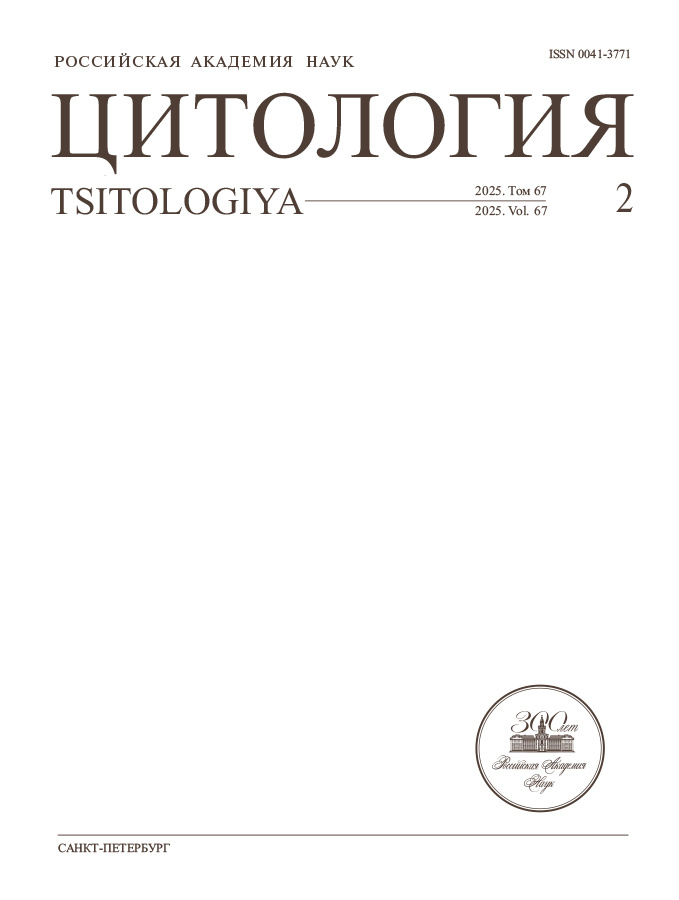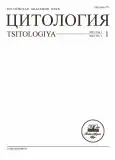Изменение содержания малых некодирующих рнк в сперматозидах как возможный механизм трансгенерационной передачи эффектов отцовского стресса: экспериментальное исследование
- Авторы: Малышева О.В.1,2, Пивина С.Г.1, Пономарева Е.Н.2, Ордян Н.Э.1
-
Учреждения:
- Институт физиологии им. И.П. Павлова РАН
- Научно-исследовательский институт акушерства, гинекологии и репродуктологии им. Д.О. Отта
- Выпуск: Том 65, № 1 (2023)
- Страницы: 28-38
- Раздел: Статьи
- URL: https://journals.rcsi.science/0041-3771/article/view/140065
- DOI: https://doi.org/10.31857/S0041377123010078
- EDN: https://elibrary.ru/GLBGPN
- ID: 140065
Цитировать
Полный текст
Аннотация
Доказано, что стресс отца может влиять на фенотип потомков, вызывая соматические, поведенческие, гормональные и молекулярные изменения. Одним из гипотетических механизмов, ответственных за передачу отцовских эффектов потомству, может быть изменение спектра регуляторных некодирующих РНК в сперматозоидах. В настоящей работе мы исследовали влияние стресса отца в моделях посттравматического стрессового расстройства (ПТСР) и депрессии на представленность малых РНК (микро- и piwiРНК) в сперме стрессированных животных. Самцов крыс линии Wistar подвергали стрессу в двух парадигмах (“стресс−рестресс” и “выученная беспомощность”), что приводит к развитию у модельных животных ПТСР-подобного и депрессивно-подобного состояний соответственно. Через 48 суток после рестресса получали препараты сперматозоидов, из которых выделяли РНК. Спектр малых РНК исследовали методом NGS-секвенирования. У самцов с ПТСР-подобным состоянием по сравнению с группой контроля было выявлено изменение экспрессии 27 piwiРНК и 77 микроРНК. Среди мишеней этих миРНК можно выделить гены, продукты которых могут быть вовлечены в такие механизмы передачи отцовских эффектов потомству, как изменения метилирования ДНК, модификации гистонов и РНК-интерференции (Dnmt3a, Setd5, Hdac1, Mllt10, Mtdh), а также гены, связанные с функционированием инсулиноподобного фактора роста 2, экспрессия гена которого, как было показано ранее, изменена в ЦНС у потомства самцов с ПТСР-подобным состоянием (Igf2, Igf2bp2, Igf2r). У самцов со смоделированным депрессивноподобным состоянием изменений представленности малых РНК не зарегистрировано. Полученные результаты свидетельствуют о выраженном влиянии стресса отца на спектр коротких некодирующих РНК в сперматозоидах у крыс, однако это влияние зависит от характера стрессового воздействия.
Ключевые слова
Об авторах
О. В. Малышева
Институт физиологии им. И.П. Павлова РАН; Научно-исследовательский институт акушерства, гинекологии и репродуктологии им. Д.О. Отта
Автор, ответственный за переписку.
Email: omal99@mail.ru
Россия, 199034, Санкт-Петербург; Россия, 199034, Санкт-Петербург
С. Г. Пивина
Институт физиологии им. И.П. Павлова РАН
Email: omal99@mail.ru
Россия, 199034, Санкт-Петербург
Е. Н. Пономарева
Научно-исследовательский институт акушерства, гинекологии и репродуктологии им. Д.О. Отта
Email: omal99@mail.ru
Россия, 199034, Санкт-Петербург
Н. Э. Ордян
Институт физиологии им. И.П. Павлова РАН
Email: omal99@mail.ru
Россия, 199034, Санкт-Петербург
Список литературы
- Ордян Н.Э., Малышева О.В., Холова Г.И., Акулова В.К., Пивина С.Г. 2021a. Зависимое от пола влияние стресса самцов крыс на память и экспрессию гена инсулиноподобного фактора роста 2 в мозге потомков. Журнал высшей нервной деятельности. Т. 71. № 3. С. 387. (Ordyan N.E., Malysheva O.V., Holova G.I., Akulova V.K., Pivina S.G. 2021. Sex-dependent influence of male rat stress on the memory and expression of the insulin-like growth factor 2 gene in the offspring brain. Zhurnal Vysshei Nervnoi Deyatelnosti imeni I. P. Pavlova. V. 71. № 3. P. 387.) https://doi.org/10.31857/S0044467721030060
- Ордян Н.Э., Малышева О.В., Акулова В.К., Холова Г.И., Пивина С.Г. 2021б. Нарушение когнитивных функций потомков самцов крыс, подвергнутых стрессированию в парадигмах “стресс−рестресс” или “выученная беспомощность”: роль инсулиноподобного фактора роста 2. Интегративная физиология. Т. 2. № 1. С.61. (Ordyan N.E., Malysheva O.V., Akulova V.K., Kholova G.I., Pivina S.G. 2021b. Cognitive impairment in the offspring of male rats exposed to stress in “stress – restress” or “learned helplessness” paradigms: The role of insulin-like growth factor 2. Integrative Physiology. V. 2. № 1. P. 61.) https://doi.org/10.33910/2687-1270-2021-2-1-61-70
- Пивина С.Г., Ракицкая В.В., Акулова В.К., Ордян Н.Э. 2015. Активность гипоталамо-гипофизарно-надпочечниковой системы пренатально стрессированных самцов крыс в экспериментальной модели посттравматического стрессового расстройства. Бюллетень экспер. биол. мед. Т. 160. № 11. С. 542. (Pivina S.G., Rakitskaya V.V., Akulova V.K., Ordyan N.E. 2016. Activity of the hypothalamic–pituitary–adrenal system in prenatally stressed male rats on the experimental model of post-traumatic stress disorder. Bull. Exper. Biol. Med. V. 160. P. 601.) https://doi.org/10.1007/s10517-016-3227-3
- Chen Q., Yan M., Cao Z., Li X., Zhang Y., Shi J., Feng G., Peng H., Zhang X., Zhang Y., Qian J., Duan E., Zhai Q., Zho Q. 2016. Sperm tsRNAs contribute to intergenerational inheritance of an acquired metabolic disorder. Science. V. 351. P. 397. https://doi.org/10.1126/science.aad7977
- Czech B., Munafó M., Ciabrelli F., Eastwood E.L., Fabry M.H., Kneuss E., Hannon G.J. 2018. piRNA-guided genome defense: from biogenesis to silencing. Annu. Rev. Genet. V. 52. P. 131. https://doi.org/10.1146/annurev-genet-120417-031441
- Czén B., Fuchs E., Wiborg O., Simon M. 2016. Animal models of major depression and their clinical implications. Progress Neuro-Psyhopharmacol. Biol. Psychiatry. V. 64. P. 293. https://doi.org/10.1016/j.pnpbp.2015.04.004
- Dietz D.M., LaPlant Q., Watts E.L., Hodes G.E., Russo S.J., Feng J., Oosting R.S., Vialou V., Nestler E.J. 2011. Paternal transmission of stress-induced pathologies. Biol. Psychiatry. V. 70. P. 408. https://doi.org/10.1016/j.biopsych.2011.05.005
- Dimofski P., Meyre D., Dreumont N., Leininger-Muller B. 2021. Consequences of paternal nutrition on offspring health and disease. Nutrients. V. 13. P. 2818. https://doi.org/10.3390/nu13082818
- Duffy K.A., Bale T.L., Epperson C.N. 2021. Germ cell drivers: transmission of preconception stress across generations. Front. Hum. Neurosci. V. 15. P. 642762. https://doi.org/10.3389/fnhum.2021.642762
- Franklin T.B., Russig H., Weiss I.C., Gräff J., Linder N., Michalon A., Vizi S., Mansuy I. 2010. Epigenetic transmission of the impact of early stress across generations. Biol. Psychiatry. V. 68. P. 408. https://doi.org/10.1016/j.biopsych.2010.05.036
- Frost R.J.A., Olson E.N. 2011. Control of glucose homeostasis and insulin sensitivity by the Let-7 family of microRNAs. Proc. Natl. Acad. Sci. USA. V. 108. P. 21075. https://doi.org/10.1073/pnas.1118922109
- Fullston T, Ohlsson Teague E.M., Palmer N.O., DeBlasio M.J., Mitchell M., Corbett M., Owens M. 2013. Paternal obesity initiates metabolic disturbances in two generations of mice with incomplete penetrance to the F2 generation and alters the transcriptional profile of testis and sperm microRNA content. FASEB J. V. 27. P. 4226. https://doi.org/10.1096/fj.12-224048
- Gapp K., Jawaid A., Sarkies P., Bohacek J., Pelczar P., Prados J., Farinell L., Miska E., Mansuy I. 2014. Implication of sperm RNAs in transgenerational inheritance of the effects of early trauma in mice. Nat. Neurosci. V. 17. P. 667. https://doi.org/10.1038/nn.3695
- Godia M., Swanson G., Krawetz S.A. 2018. A history of why fathers’ RNA matters. Biol. Reprod. V. 99. P. 147. https://doi.org/10.1093/biolre/ioy007
- Guo L., Chao S.-B., Xiao L., Wang Z.-B., Meng T.-G., Li Y.-Y., Han Z-M., Ouyang Y.-C., Hou Y, Sun Q.-Y., Ou X.-H. 2017. Sperm-carried RNAs play critical roles in mouse embryonic development. Oncotarget. V. 8. P. 67394. https://doi.org/10.18632/oncotarget.18672
- Harker A., Carroll C., Raza S., Kolb B., Gibb R. 2018. Preconception paternal stress in rats alters brain and behavior in offspring. Neurosci. V. 388. P. 474. https://doi.org/10.1016/j.neuroscience.2018.06.034
- Huang Y., Zhang J.L., Yu X.L., Xu T.S., Wang Z., Bin Z., Chao X. 2013. Molecular functions of small regulatory noncoding RNA. Biochemistry. V. 78. P. 221. https://doi.org/10.1134/S0006297913030024
- Jodar M., Selvaraju S., Sendler E., Diamond M.P., Krawetz S.A. 2013. The presence, role and clinical use of spermatozoal RNAs. Hum. Reprod. Update. V. 19. P. 604. https://doi.org/10.1093/humupd/dmt031
- Kamalidehghan B., Habibi M., Afjeh S.S., Shoai M., Alidoost S., Ghal R.A., Eshghifar N., Pouresmaeili F. 2020. The importance of small non-coding RNAs in human reproduction: a review article. Application Clinical Genetics. V. 13. P. 1. https://doi.org/10.2147/TACG.S207491
- Kiani J., Rassoulzadegan M. 2013. A load of small RNAs in the sperm – how many bits of hereditary information? Cell Res. V. 23. P. 18. https://doi.org/10.1038/cr.2012.181
- Love M.I., Huber W., Anders S. 2014. Moderated estimation of fold change and dispersion for RNA-seq data with DESeq2. Genome Biol. V. 15. P. 550. https://doi.org/10.1186/s13059-014-0550-8
- Ly L., Chan D., Trasler J.M. 2015. Developmental windows of susceptibility for epigenetic inheritance through the male germline. Seminars Cell Devel. Biol. V. 43. P. 96. https://doi.org/10.1016/j.semcdb.2015.07.006
- Morgan C.P., Chan J.C., Bale T.L. 2019. Driving the next generation: paternal lifetime experiences transmitted via extracellular vesicles and their small RNA cargo. Biol. Psychiatry. V. 85. P. 164. https://doi.org/10.1016/j.biopsych.2018.09.007
- Morgan C.P., Shetty A.C., Chan J.C., Berger D.S., Ament S.A., Epperson C.N., Bale T.L. 2020. Repeated sampling facilitates within‑ and between‑subject modeling of the human sperm transcriptome to identify dynamic and stress‑responsive sncRNAs. Scientific Reports. V. 10. P. 17498. https://doi.org/10.1038/s41598-020-73867-7
- Ordyan N.E., Malysheva O.V., Akulova V.K., Pivina S.G., Kholova G.I. 2020. The capability to learn and expression of the insulin-like growth factor II gene in the brain of male rats whose fathers were subjected to stress factors in the “stress–restress” paradigm. Neurochem. J. V. 14. P. 191. https://doi.org/10.1134/S1819712420020075
- Ordyan N.E., Pivina S.G., Akulova V.K., Kholova G.I. 2021. Changes in the nature of behavior and the activity of the hypophyseal-adrenocortical system in the offspring of paternal rats subjected to stress in the stress–restress paradigm before mating. Neurosci. Behav. Physiol. V. 51. P. 528. https://doi.org/10.1007/s11055-021-01100-7
- Ozata D.M., Gainetdinov I., Zoch A., O’Caroll D., Zamore P.D. 2019. PIWI-interacting RNAs: small RNAs with big functions. Nat. Rev. Genet. V. 20. P. 89. https://doi.org/10.1038/s41576-018-0073-3
- Peng H., Shi J., Zhang Y., Zhang H., Liao S., Li W., Lei L., Han C., Ning L., Cao Y., Zhou Q., Chen Q., Duan E. 2012. A novel class of tRNA-derived small RNAs extremely enriched in mature mouse sperm. Cell Res. V. 22. P. 1609. https://doi.org/10.1038/cr.2012.141
- Rando O.J. 2012. Daddy issues: paternal effects on phenotype. Cell. V. 151. P. 702. https://doi.org/10.1016/j.cell.2012.10.020
- Rodgers A.B., Morgan C.P., Bronson S.L., Revello S., Bale T.L. 2013. Paternal stress exposure alters sperm microRNA content and reprograms offspring HPA stress axis regulation. J. Neurosci. V. 33. P. 9003. https://doi.org/10.1523/JNEUROSCI.0914-13.2013
- Rodgers A.B., Bale T.L. 2015. Germ cell origins of posttraumatic stress disorder risk: the transgenerational impact of parental stress experience. Biol. Psychiatry. V. 78. P. 307. https://doi.org/10.1016/j.biopsych.2015.03.018
- Rodgers A.B., Morgan C.P., Leu N.A., Bale T.L. 2015. Transgenerational epigenetic programming via sperm microRNA recapitulates effects of paternal stress. Proc. Natl. Acad. Sci. USA. V. 112. P. 13699. https://doi.org/10.1073/pnas.1508347112
- Sharma A. 2013. Transgenerational epigenetic inheritance: Focus on soma to germline information transfer. Progress Biophysics Mol. Biology. V. 113. P. 439. https://doi.org/10.1016/j.pbiomolbio.2012.12.003
- Short A.K., Fennell K.A., Perreau V.M., Fox A., O’Bryan M.K., Kim J.H., Bredy T.W., Pang T.Y., Hannan A.J. 2016. Elevated paternal glucocorticoid exposure alters the small noncoding RNA profile in sperm and modifies anxiety and depressive phenotypes in the offspring. Transl. Psychiatry. V. 6. P. e837. Ye
- Xavier M.J., Roman S.D., Aitken R.J., Nixon B. 2019. Transgenerational inheritance: how impacts to the epigenetic and genetic information of parents affect offspring health. Hum. Reprod. Update. V. 25. P. 518. https://doi.org/10.1093/humupd/dmz017
- Yan W. 2014. Potential roles of noncoding RNAs in environmental epigenetic transgenerational inheritance. Mol. Cell. Endocrinol. V. 398. P. 24. https://doi.org/10.1016/j.mce.2014.09.008
- Yehuda R., Blair W., Labinsky E., Bierer L.M. 2007a. Effects of parental PTSD on the cortisol response to dexamethasone administration in their adult offspring. Am. J. Psychiatry. V. 164. P. 163. https://doi.org/10.1176/ajp.2007.164.1.163
- Yehuda R., Teicher M.H., Seckl J.R., Grossman R.A., Morris A., Bi-erer L.M. 2007b. Parental posttraumatic stress disorder as a vulnerability factor for low cortisol trait in offspring of Holocaust survivors. Archiv. Gen. Psychiatry. V. 64. P. 1040. https://doi.org/10.1001/archpsyc.64.9.1040
- Yeshurun S., Hannan A.J. 2019. Transgenerational epigenetic influences of paternal environmental exposures on brain function and predisposition to psychiatric disorders. Mol. Psychiatry. V. 24. P. 536. https://doi.org/10.1038/s41380-018-0039-z
- Yuan S., Schuster A., Tang C., Yu T., Ortogero N., Bao J., Zheng H., Yan W. 2016. Sperm-borne miRNAs and endo-siRNAs are important for fertilization and preimplantation embryonic development. Develop. V. 143. P. 635. https://doi.org/10.1242/dev.131755
Дополнительные файлы












